
Folks, In IT Operations, it's a very generic task to monitor server metrices like utilization of cpu/memory and disk or filesystems, but in case any of the metrics gets triggered to be critical, then dedicated persons need to perform some basic troubleshooting by logging into server and find out the initial cause of utilization which person has to perform multiple times if he gets multiple same alert that creates boredom and not productive at all. So as a workaround, there can be a system developed which will react once alarm gets triggered and act on those instances by executing few basic troubleshooting commands. Just to summarize the problem statement and expectation -
Develop a system which will fulfill below expectations -
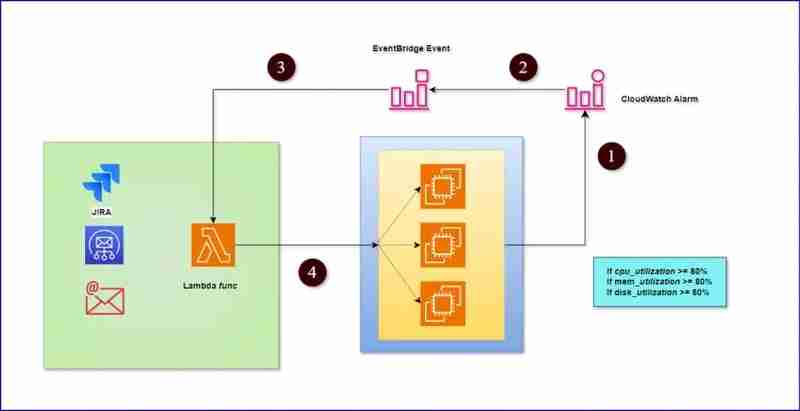
A. CloudWatch Agent Installation and Configuration Setup :
Open Systems Manager console and click on "Documents"
Search for "AWS-ConfigureAWSPackage" document and execute by providing required details.
Package Name = AmazonCloudwatchAgent
Post installation, CloudWatch agent needs to be configured as per configuration file . For this, execute AmazonCloudWatch-ManageAgent document. Also, make sure JSON CloudWatch config file is stored in SSM Parameter.
Once you see that metrices are reporting to CloudWatch console, then create an alarm for CPU and Memory utilizations etc.
B. Setup EventBridge Rule :
To track the alarm state changes, here, we have customized pattern a little to track alarm state changes from OK to ALARM only, not reverse one. Then, add this rule to a lambda function as a trigger.
{
"source": ["aws.cloudwatch"],
"detail-type": ["CloudWatch Alarm State Change"],
"detail": {
"state": {
"value": ["ALARM"]
},
"previousState": {
"value": ["OK"]
}
}
}
Lambda Prerequisites :
We need below modules to import for make the codes work -
Note: From above modules, except 'requests' module rest all are downloaded within a lambda underlying infrastructure by default. Importing 'requests' module directly will not be supported in Lambda. Hence, first, install request module in a folder in your local machine(laptop) by executing below command -
pip3 install requests -t <directory path> --no-user
_After that, this will be downloaded in the folder from where you are executing above command or where you want to store the module source codes, here I hope lambda code is being prepared in your local machine. If yes, then create a zip file of that entire lambda source codes with module. After that, upload the zip file to lambda function.
So, here we are performing below two scenarios -
1. CPU Utilization - If CPU utilization alarm gets triggered, then lambda function need to fetch the instance and login to that instance and perform top 5 high consuming processes. Then, it will create a JIRA issue and add the process details in the comment section. Simultaneously, it will send an email with alarm details and jira issue details with process output.
2. Memory Utilization - Same approach as above
Now, let me reframe the task details which lambda is supposed to perform -
First Set (Define the cpu and memory function) :
################# Importing Required Modules ################
############################################################
import json
import boto3
import time
import os
import sys
sys.path.append('./python') ## This will add requests module along with all dependencies into this script
import requests
from requests.auth import HTTPBasicAuth
################## Calling AWS Services ###################
###########################################################
ssm = boto3.client('ssm')
sns_client = boto3.client('sns')
ec2 = boto3.client('ec2')
################## Defining Blank Variable ################
###########################################################
cpu_process_op = ''
mem_process_op = ''
issueid = ''
issuekey = ''
issuelink = ''
################# Function for CPU Utilization ################
###############################################################
def cpu_utilization(instanceid, metric_name, previous_state, current_state):
global cpu_process_op
if previous_state == 'OK' and current_state == 'ALARM':
command = 'ps -eo user,pid,ppid,cmd,%mem,%cpu --sort=-%cpu | head -5'
print(f'Impacted Instance ID is : {instanceid}, Metric Name: {metric_name}')
# Start a session
print(f'Starting session to {instanceid}')
response = ssm.send_command(InstanceIds = [instanceid], DocumentName="AWS-RunShellScript", Parameters={'commands': [command]})
command_id = response['Command']['CommandId']
print(f'Command ID: {command_id}')
# Retrieve the command output
time.sleep(4)
output = ssm.get_command_invocation(CommandId=command_id, InstanceId=instanceid)
print('Please find below output -\n', output['StandardOutputContent'])
cpu_process_op = output['StandardOutputContent']
else:
print('None')
################# Function for Memory Utilization ################
###############################################################
def mem_utilization(instanceid, metric_name, previous_state, current_state):
global mem_process_op
if previous_state == 'OK' and current_state == 'ALARM':
command = 'ps -eo user,pid,ppid,cmd,%mem,%cpu --sort=-%mem | head -5'
print(f'Impacted Instance ID is : {instanceid}, Metric Name: {metric_name}')
# Start a session
print(f'Starting session to {instanceid}')
response = ssm.send_command(InstanceIds = [instanceid], DocumentName="AWS-RunShellScript", Parameters={'commands': [command]})
command_id = response['Command']['CommandId']
print(f'Command ID: {command_id}')
# Retrieve the command output
time.sleep(4)
output = ssm.get_command_invocation(CommandId=command_id, InstanceId=instanceid)
print('Please find below output -\n', output['StandardOutputContent'])
mem_process_op = output['StandardOutputContent']
else:
print('None')
Second Set (Create JIRA Issue) :
################## Create JIRA Issue ################
#####################################################
def create_issues(instanceid, metric_name, account, timestamp, region, current_state, previous_state, cpu_process_op, mem_process_op, metric_val):
## Create Issue ##
url ='https://<your-user-name>.atlassian.net//rest/api/2/issue'
username = os.environ['username']
api_token = os.environ['token']
project = 'AnirbanSpace'
issue_type = 'Incident'
assignee = os.environ['username']
summ_metric = '%CPU Utilization' if 'CPU' in metric_name else '%Memory Utilization' if 'mem' in metric_name else '%Filesystem Utilization' if metric_name == 'disk_used_percent' else None
metric_val = metric_val
summary = f'Client | {account} | {instanceid} | {summ_metric} | Metric Value: {metric_val}'
description = f'Client: Company\nAccount: {account}\nRegion: {region}\nInstanceID = {instanceid}\nTimestamp = {timestamp}\nCurrent State: {current_state}\nPrevious State = {previous_state}\nMetric Value = {metric_val}'
issue_data = {
"fields": {
"project": {
"key": "SCRUM"
},
"summary": summary,
"description": description,
"issuetype": {
"name": issue_type
},
"assignee": {
"name": assignee
}
}
}
data = json.dumps(issue_data)
headers = {
"Accept": "application/json",
"Content-Type": "application/json"
}
auth = HTTPBasicAuth(username, api_token)
response = requests.post(url, headers=headers, auth=auth, data=data)
global issueid
global issuekey
global issuelink
issueid = response.json().get('id')
issuekey = response.json().get('key')
issuelink = response.json().get('self')
################ Add Comment To Above Created JIRA Issue ###################
output = cpu_process_op if metric_name == 'CPUUtilization' else mem_process_op if metric_name == 'mem_used_percent' else None
comment_api_url = f"{url}/{issuekey}/comment"
add_comment = requests.post(comment_api_url, headers=headers, auth=auth, data=json.dumps({"body": output}))
## Check the response
if response.status_code == 201:
print("Issue created successfully. Issue key:", response.json().get('key'))
else:
print(f"Failed to create issue. Status code: {response.status_code}, Response: {response.text}")
Third Set (Send an Email) :
################## Send An Email ################
#################################################
def send_email(instanceid, metric_name, account, region, timestamp, current_state, current_reason, previous_state, previous_reason, cpu_process_op, mem_process_op, metric_val, issueid, issuekey, issuelink):
### Define a dictionary of custom input ###
metric_list = {'mem_used_percent': 'Memory', 'disk_used_percent': 'Disk', 'CPUUtilization': 'CPU'}
### Conditions ###
if previous_state == 'OK' and current_state == 'ALARM' and metric_name in list(metric_list.keys()):
metric_msg = metric_list[metric_name]
output = cpu_process_op if metric_name == 'CPUUtilization' else mem_process_op if metric_name == 'mem_used_percent' else None
print('This is output', output)
email_body = f"Hi Team, \n\nPlease be informed that {metric_msg} utilization is high for the instanceid {instanceid}. Please find below more information \n\nAlarm Details:\nMetricName = {metric_name}, \nAccount = {account}, \nTimestamp = {timestamp}, \nRegion = {region}, \nInstanceID = {instanceid}, \nCurrentState = {current_state}, \nReason = {current_reason}, \nMetricValue = {metric_val}, \nThreshold = 80.00 \n\nProcessOutput: \n{output}\nIncident Deatils:\nIssueID = {issueid}, \nIssueKey = {issuekey}, \nLink = {issuelink}\n\nRegards,\nAnirban Das,\nGlobal Cloud Operations Team"
res = sns_client.publish(
TopicArn = os.environ['snsarn'],
Subject = f'High {metric_msg} Utilization Alert : {instanceid}',
Message = str(email_body)
)
print('Mail has been sent') if res else print('Email not sent')
else:
email_body = str(0)
Fourth Set (Calling Lambda Handler Function) :
################## Lambda Handler Function ################
###########################################################
def lambda_handler(event, context):
instanceid = event['detail']['configuration']['metrics'][0]['metricStat']['metric']['dimensions']['InstanceId']
metric_name = event['detail']['configuration']['metrics'][0]['metricStat']['metric']['name']
account = event['account']
timestamp = event['time']
region = event['region']
current_state = event['detail']['state']['value']
current_reason = event['detail']['state']['reason']
previous_state = event['detail']['previousState']['value']
previous_reason = event['detail']['previousState']['reason']
metric_val = json.loads(event['detail']['state']['reasonData'])['evaluatedDatapoints'][0]['value']
##### function calling #####
if metric_name == 'CPUUtilization':
cpu_utilization(instanceid, metric_name, previous_state, current_state)
create_issues(instanceid, metric_name, account, timestamp, region, current_state, previous_state, cpu_process_op, mem_process_op, metric_val)
send_email(instanceid, metric_name, account, region, timestamp, current_state, current_reason, previous_state, previous_reason, cpu_process_op, mem_process_op, metric_val, issueid, issuekey, issuelink)
elif metric_name == 'mem_used_percent':
mem_utilization(instanceid, metric_name, previous_state, current_state)
create_issues(instanceid, metric_name, account, timestamp, region, current_state, previous_state, cpu_process_op, mem_process_op, metric_val)
send_email(instanceid, metric_name, account, region, timestamp, current_state, current_reason, previous_state, previous_reason, cpu_process_op, mem_process_op, metric_val, issueid, issuekey, issuelink)
else:
None
Alarm Email Screenshot :
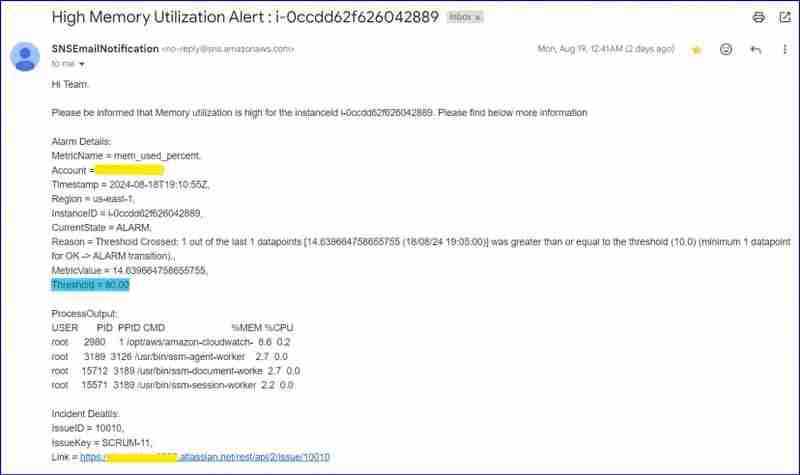
Note: In ideal scenario, threshold is 80%, but for testing I changed it to 10%. Please see the Reason.
Alarm JIRA Issue :
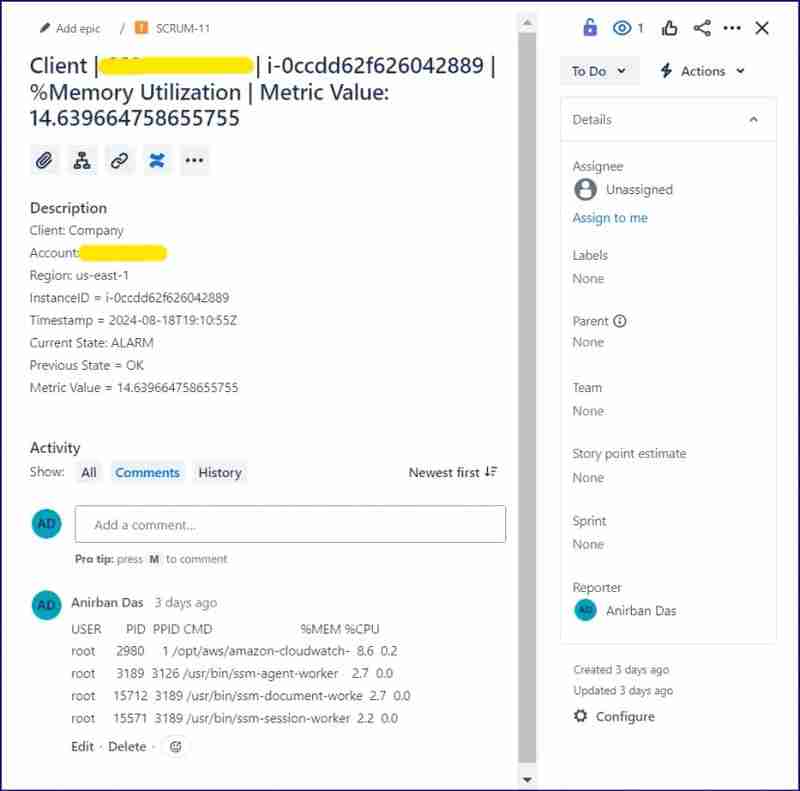
In this scenario, if any server cpu or memory utilization metrics data are not captured, then alarm state gets changed from OK to INSUFFICIENT_DATA. This state can be achieved in two ways - a.) If server is in stopped state b.) If CloudWatch agent is not running or went in dead state.
So, as per below script, you'll be able to see that when cpu or memory utilization alarm status gets insufficient data, then lambda will first check if instance is in running status or not. If instance is in running state, then it will login and check CloudWatch agent status. Post that, it will create a JIRA issue and post the agent status in comment section of JIRA issue. After that, it will send an email with alarm details and agent status.
Full Code :
################# Importing Required Modules ################
############################################################
import json
import boto3
import time
import os
import sys
sys.path.append('./python') ## This will add requests module along with all dependencies into this script
import requests
from requests.auth import HTTPBasicAuth
################## Calling AWS Services ###################
###########################################################
ssm = boto3.client('ssm')
sns_client = boto3.client('sns')
ec2 = boto3.client('ec2')
################## Defining Blank Variable ################
###########################################################
cpu_process_op = ''
mem_process_op = ''
issueid = ''
issuekey = ''
issuelink = ''
################# Function for CPU Utilization ################
###############################################################
def cpu_utilization(instanceid, metric_name, previous_state, current_state):
global cpu_process_op
if previous_state == 'OK' and current_state == 'INSUFFICIENT_DATA':
ec2_status = ec2.describe_instance_status(InstanceIds=[instanceid,])['InstanceStatuses'][0]['InstanceState']['Name']
if ec2_status == 'running':
command = 'systemctl status amazon-cloudwatch-agent;sleep 3;systemctl restart amazon-cloudwatch-agent'
print(f'Impacted Instance ID is : {instanceid}, Metric Name: {metric_name}')
# Start a session
print(f'Starting session to {instanceid}')
response = ssm.send_command(InstanceIds = [instanceid], DocumentName="AWS-RunShellScript", Parameters={'commands': [command]})
command_id = response['Command']['CommandId']
print(f'Command ID: {command_id}')
# Retrieve the command output
time.sleep(4)
output = ssm.get_command_invocation(CommandId=command_id, InstanceId=instanceid)
print('Please find below output -\n', output['StandardOutputContent'])
cpu_process_op = output['StandardOutputContent']
else:
cpu_process_op = f'Instance current status is {ec2_status}. Not able to reach out!!'
print(f'Instance current status is {ec2_status}. Not able to reach out!!')
else:
print('None')
################# Function for Memory Utilization ################
###############################################################
def mem_utilization(instanceid, metric_name, previous_state, current_state):
global mem_process_op
if previous_state == 'OK' and current_state == 'INSUFFICIENT_DATA':
ec2_status = ec2.describe_instance_status(InstanceIds=[instanceid,])['InstanceStatuses'][0]['InstanceState']['Name']
if ec2_status == 'running':
command = 'systemctl status amazon-cloudwatch-agent'
print(f'Impacted Instance ID is : {instanceid}, Metric Name: {metric_name}')
# Start a session
print(f'Starting session to {instanceid}')
response = ssm.send_command(InstanceIds = [instanceid], DocumentName="AWS-RunShellScript", Parameters={'commands': [command]})
command_id = response['Command']['CommandId']
print(f'Command ID: {command_id}')
# Retrieve the command output
time.sleep(4)
output = ssm.get_command_invocation(CommandId=command_id, InstanceId=instanceid)
print('Please find below output -\n', output['StandardOutputContent'])
mem_process_op = output['StandardOutputContent']
print(mem_process_op)
else:
mem_process_op = f'Instance current status is {ec2_status}. Not able to reach out!!'
print(f'Instance current status is {ec2_status}. Not able to reach out!!')
else:
print('None')
################## Create JIRA Issue ################
#####################################################
def create_issues(instanceid, metric_name, account, timestamp, region, current_state, previous_state, cpu_process_op, mem_process_op, metric_val):
## Create Issue ##
url ='https://<your-user-name>.atlassian.net//rest/api/2/issue'
username = os.environ['username']
api_token = os.environ['token']
project = 'AnirbanSpace'
issue_type = 'Incident'
assignee = os.environ['username']
summ_metric = '%CPU Utilization' if 'CPU' in metric_name else '%Memory Utilization' if 'mem' in metric_name else '%Filesystem Utilization' if metric_name == 'disk_used_percent' else None
metric_val = metric_val
summary = f'Client | {account} | {instanceid} | {summ_metric} | Metric Value: {metric_val}'
description = f'Client: Company\nAccount: {account}\nRegion: {region}\nInstanceID = {instanceid}\nTimestamp = {timestamp}\nCurrent State: {current_state}\nPrevious State = {previous_state}\nMetric Value = {metric_val}'
issue_data = {
"fields": {
"project": {
"key": "SCRUM"
},
"summary": summary,
"description": description,
"issuetype": {
"name": issue_type
},
"assignee": {
"name": assignee
}
}
}
data = json.dumps(issue_data)
headers = {
"Accept": "application/json",
"Content-Type": "application/json"
}
auth = HTTPBasicAuth(username, api_token)
response = requests.post(url, headers=headers, auth=auth, data=data)
global issueid
global issuekey
global issuelink
issueid = response.json().get('id')
issuekey = response.json().get('key')
issuelink = response.json().get('self')
################ Add Comment To Above Created JIRA Issue ###################
output = cpu_process_op if metric_name == 'CPUUtilization' else mem_process_op if metric_name == 'mem_used_percent' else None
comment_api_url = f"{url}/{issuekey}/comment"
add_comment = requests.post(comment_api_url, headers=headers, auth=auth, data=json.dumps({"body": output}))
## Check the response
if response.status_code == 201:
print("Issue created successfully. Issue key:", response.json().get('key'))
else:
print(f"Failed to create issue. Status code: {response.status_code}, Response: {response.text}")
################## Send An Email ################
#################################################
def send_email(instanceid, metric_name, account, region, timestamp, current_state, current_reason, previous_state, previous_reason, cpu_process_op, mem_process_op, metric_val, issueid, issuekey, issuelink):
### Define a dictionary of custom input ###
metric_list = {'mem_used_percent': 'Memory', 'disk_used_percent': 'Disk', 'CPUUtilization': 'CPU'}
### Conditions ###
if previous_state == 'OK' and current_state == 'INSUFFICIENT_DATA' and metric_name in list(metric_list.keys()):
metric_msg = metric_list[metric_name]
output = cpu_process_op if metric_name == 'CPUUtilization' else mem_process_op if metric_name == 'mem_used_percent' else None
email_body = f"Hi Team, \n\nPlease be informed that {metric_msg} utilization alarm state has been changed to {current_state} for the instanceid {instanceid}. Please find below more information \n\nAlarm Details:\nMetricName = {metric_name}, \n Account = {account}, \nTimestamp = {timestamp}, \nRegion = {region}, \nInstanceID = {instanceid}, \nCurrentState = {current_state}, \nReason = {current_reason}, \nMetricValue = {metric_val}, \nThreshold = 80.00 \n\nProcessOutput = \n{output}\nIncident Deatils:\nIssueID = {issueid}, \nIssueKey = {issuekey}, \nLink = {issuelink}\n\nRegards,\nAnirban Das,\nGlobal Cloud Operations Team"
res = sns_client.publish(
TopicArn = os.environ['snsarn'],
Subject = f'Insufficient {metric_msg} Utilization Alarm : {instanceid}',
Message = str(email_body)
)
print('Mail has been sent') if res else print('Email not sent')
else:
email_body = str(0)
################## Lambda Handler Function ################
###########################################################
def lambda_handler(event, context):
instanceid = event['detail']['configuration']['metrics'][0]['metricStat']['metric']['dimensions']['InstanceId']
metric_name = event['detail']['configuration']['metrics'][0]['metricStat']['metric']['name']
account = event['account']
timestamp = event['time']
region = event['region']
current_state = event['detail']['state']['value']
current_reason = event['detail']['state']['reason']
previous_state = event['detail']['previousState']['value']
previous_reason = event['detail']['previousState']['reason']
metric_val = 'NA'
##### function calling #####
if metric_name == 'CPUUtilization':
cpu_utilization(instanceid, metric_name, previous_state, current_state)
create_issues(instanceid, metric_name, account, timestamp, region, current_state, previous_state, cpu_process_op, mem_process_op, metric_val)
send_email(instanceid, metric_name, account, region, timestamp, current_state, current_reason, previous_state, previous_reason, cpu_process_op, mem_process_op, metric_val, issueid, issuekey, issuelink)
elif metric_name == 'mem_used_percent':
mem_utilization(instanceid, metric_name, previous_state, current_state)
create_issues(instanceid, metric_name, account, timestamp, region, current_state, previous_state, cpu_process_op, mem_process_op, metric_val)
send_email(instanceid, metric_name, account, region, timestamp, current_state, current_reason, previous_state, previous_reason, cpu_process_op, mem_process_op, metric_val, issueid, issuekey, issuelink)
else:
None
Insufficient Data Email Screenshot :
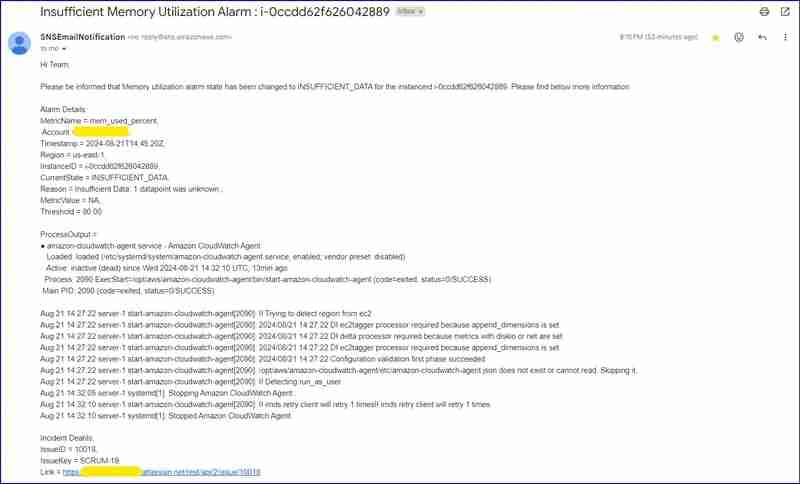
Insufficient data JIRA Issue :
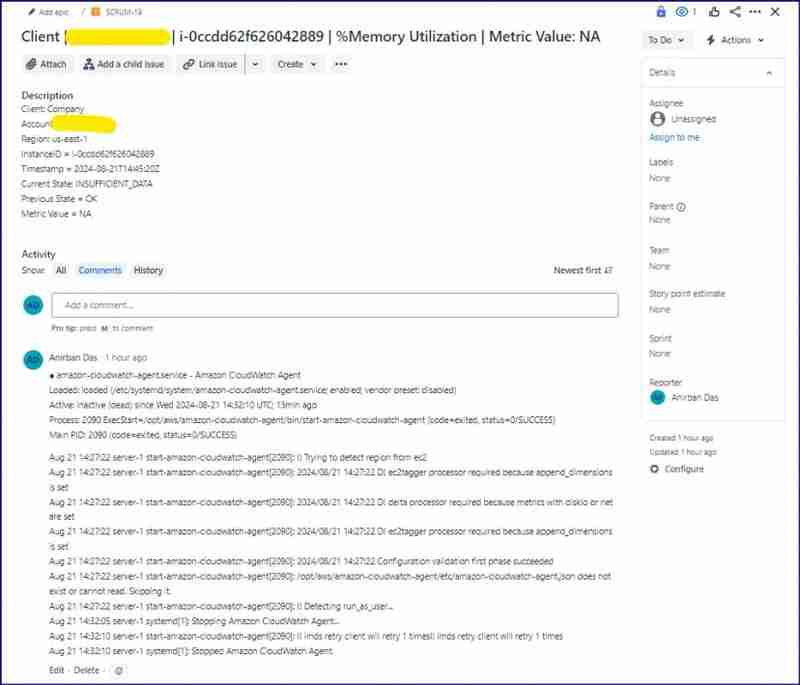
In this article, we have tested scenarios on both cpu and memory utilization, but there can be lots of metrics on which we can configure auto-incident and auto-email functionality which will reduce significant efforts in terms of monitoring and creating incidents and all. This solution has given a initial approach how we can proceed further, but for sure there can be other possibilities to achieve this goal. I believe you all will understand the way we tried to make this relatable. Please like and comment if you love this article or have any other suggestions, so that we can populate in coming articles. ??
Thanks!!
Anirban Das
The above is the detailed content of Automatic Troubleshooting & ITSM System using EventBridge and Lambda. For more information, please follow other related articles on the PHP Chinese website!




